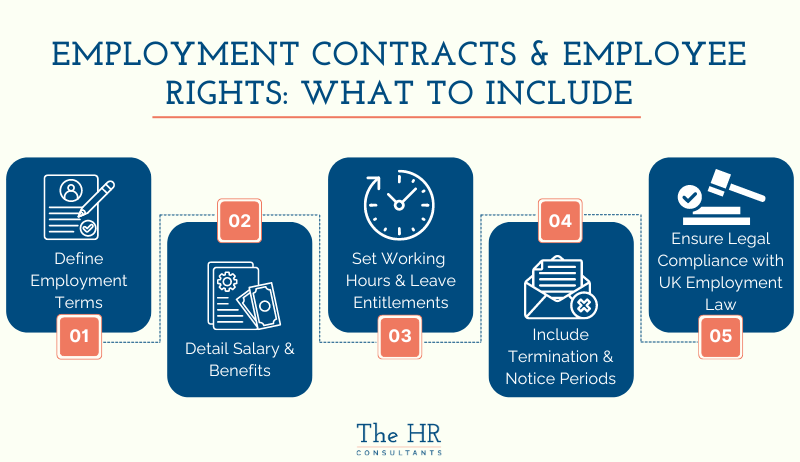"An employment contract is a formal agreement between an employer and an employee, outlining the key terms of their working relationship. This includes details such as job title, salary, working hours, and specific duties.
By establishing these terms in writing, both parties understand their rights and responsibilities, ensuring a clear and productive working relationship.
Understanding the different types of employment contracts is essential for both employees and employers to avoid disputes and ensure compliance with the law.

For expert advice on contracts and employee rights, contact The HR Consultants today.
What Is an Employment Contract?
An employment contract is a formal, legally binding agreement between an employer and an employee that outlines the key terms of their working relationship. It typically includes details such as the job title, salary, working hours, responsibilities, and employment rights.
Having a clear contract helps both parties understand their obligations and rights, ensuring a fair working relationship.
Written vs Verbal Contracts
While verbal agreements can be valid, a written contract provides greater clarity and security for both the employer and employee. A written statement of employment details key employment particulars, such as pay, duties, and holiday entitlement, and can prevent misunderstandings.
Having a clear written statement is important to avoid disputes and is often a legal requirement for many employment arrangements.
Types of Employment Contracts
There are various types of employment contracts that have different costs and each cater to different working arrangements. Each contract type outlines specific employment terms, rights, and responsibilities, ensuring clarity for both the employer and the employee.
Full-Time and Part-Time Contracts
Both full-time and part-time contracts offer key benefits such as paid leave, sick pay, and access to a workplace pension scheme. The main distinction lies in the number of working hours.
- Full-time employees typically work over 35 hours per week.
- Part-time contracts offer fewer hours, usually under 35 per week.
- Both types of contracts protect employees' rights under employment law.
- Full-time contracts may offer additional benefits, such as greater access to career development opportunities, but both provide similar protections.
Fixed-Term Contracts
A fixed-term contract is used when an employee is hired for a set duration, such as to complete a project. These contracts include a clear start date and end date. Employers benefit from flexibility, while employees receive the same rights as permanent staff, including holiday pay and sick pay.
Zero-Hours and Casual Contracts
A zero-hours contract allows employees to work without guaranteed hours, offering flexibility for both employers and workers. Employees can accept or decline work based on availability. Shift patterns often vary, making it ideal for industries requiring irregular hours, like hospitality.
Freelance and Self-Employed Contracts
A self-employed contractor works independently and is responsible for their own tax and insurance contributions. Unlike regular employees, freelancers set their own working hours and are typically not entitled to benefits like holiday pay or sick pay, offering greater flexibility but fewer protections.
Key Benefits of Employment Contracts
Employment contracts offer a range of benefits, providing protection and clarity for both employers and employees.
They set the foundation for a fair and transparent employer-employee relationship, ensuring both parties understand their rights and obligations.
Job Security and Legal Protection
A legally binding employment contract offers job security by clearly defining the conditions of employment. It protects employees from unfair practices like constructive dismissal and ensures that any termination follows proper procedures, offering security and peace of mind.
Clarity on Employment Terms
Contracts clearly define employment terms, outlining specific duties, expectations, and rights such as holiday pay, pension schemes, and notice periods. This helps prevent misunderstandings, ensuring employees and employers know what is expected throughout the employment period.
Reducing Disputes
Clear employment terms significantly reduce workplace disputes. When the responsibilities and rights of both parties are well-documented, it becomes easier to resolve issues.

Contracts also set out grievance procedures, which help avoid the need for legal action and encourage open communication within the workplace.
Employment Contracts and Employee Rights: What to Include
Drafting a detailed employment contract is essential for ensuring both employers and employees understand their rights and obligations.
To create a legally compliant and fair agreement, follow these key steps:
- Define Employment Terms
- Job Title & Responsibilities: Clearly outline the employee’s role and primary duties. This provides clarity and avoids confusion about expectations.
- Start Date & Employment Type: Specify whether the role is full-time, part-time, temporary, or permanent.
- Detail Salary and Benefits
- Pay Structure: Include the agreed salary, how it will be paid (e.g., monthly or weekly), and details about overtime or bonuses.
- Additional Benefits: Clearly state any extra perks, including pension schemes, health insurance, or performance-related bonuses.
- Set Working Hours & Leave Entitlements
- Working Hours: Specify the standard working hours, including flexibility if applicable.
- Leave Entitlement: Provide details on annual leave, sick leave, and other statutory leave such as maternity or paternity leave.
- Include Termination and Notice Periods
- Notice Period: Clearly outline the notice period for both employer and employee.
- Grounds for Termination: Include acceptable reasons for dismissal, such as redundancy, misconduct, or poor performance.
- Ensure Legal Compliance with UK Employment Law
- Equal Pay & Anti-Discrimination: Confirm that the contract adheres to laws ensuring no discrimination in pay or treatment based on gender, race, or other protected characteristics.
- Grievance Procedures: Include a formal procedure for addressing workplace issues or disputes, ensuring compliance with legal standards.

By structuring the employment contract around these core elements, businesses can ensure that employee rights are protected, and legal obligations are fulfilled. This clear, structured approach reduces the likelihood of disputes and creates a foundation for a strong working relationship.
Minimum Wage and Sick Pay
Every employee in the UK has the right to certain minimum standards regarding pay and sick leave. These rights must be clearly stated in their employment contracts, ensuring compliance with UK employment law.
- Employees are entitled to the national minimum wage, which is a legal requirement.
- Contracts must specify how sick pay is handled, including whether statutory sick pay (SSP) or enhanced company terms apply.
- Employers need to ensure transparency in pay structures, particularly around sick leave and wage entitlement.
Holiday Entitlement and Benefits
Employees have a right to holiday entitlement and other benefits, all of which should be clearly stated in their employment contracts. These entitlements help ensure fair treatment across the workforce.
- Employees are entitled to a minimum of 5.6 weeks of paid leave per year.
- Contracts may also include additional benefits such as enhanced holiday, pension schemes, and company-specific perks.
- Employers are required by law to enrol eligible employees into a workplace pension scheme for long-term financial security.
Understanding Notice Periods and Termination
Notice periods are a key part of employment contracts, detailing the required length of time an employee or employer must give before ending the working relationship.
These periods are important for ensuring a smooth transition when an employee leaves or a position is terminated.
Termination Conditions
Contracts specify the conditions under which employment can be terminated, including dismissal, resignation, or mutual agreement.
The notice period, grievance procedures, and any legal requirements around constructive dismissal or other issues are clearly outlined to protect both parties during the termination process.
Employment Tribunal and Disputes
If disputes arise regarding the termination or breach of contract, an employee may take the matter to an employment tribunal. Employment contracts help minimise such disputes by setting out clear expectations, but if a case does go to tribunal, the terms of the contract will play a key role in determining the outcome.
Get in Touch
Understanding the details of an employment contract is vital for both employers and employees, as it defines rights and obligations within the working relationship. Regularly reviewing and updating these contracts ensures that they stay aligned with current regulations and protect all parties involved.

If you're looking for guidance on how to keep your contracts up to date, contact us for expert advice and support.
Frequently Asked Questions
Here are some common questions about employment contracts and their key aspects.
Do employment contracts need to be in writing?
While a verbal agreement can be valid, it's highly recommended to have a written contract. A written statement of employment provides clarity on terms like salary, working hours, and benefits, reducing the risk of disputes.
What’s the difference between full-time and part-time contracts?
A full-time contract typically involves working over 35 hours per week, while part-time contracts have fewer hours. Both provide similar rights, including paid leave and sick pay.
How does a fixed-term contract work?
A fixed-term contract is for a specific duration, with a clear start date and end date. Employees receive the same rights as permanent staff, including holiday pay and access to a workplace pension scheme.
What is the importance of a notice period in an employment contract?
A notice period is vital as it allows both the employer and employee to prepare for the termination of the working relationship. It gives time to complete necessary tasks, handovers, or find replacements. The notice period is usually defined in the employment contract.
Can an employment contract be changed after it’s signed?
Yes, but any changes to an employment contract must be agreed upon by both the employer and employee. Updates might be necessary for changes in roles, working hours, or conditions, and should always be documented in writing."













